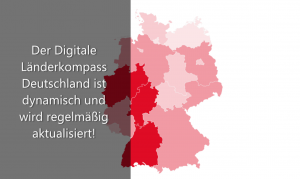- Digital policy: Hesse, Baden-Württemberg & North Rhine-Westphalia are trailblazers
- Digital heroes: Hesse, Baden-Württemberg & North Rhine-Westphalia are the Top 3 federal states
- Digital compass shows: The German federal states have increased the importance of digital policy
- Biggest challenges: Broadband expansion, e-government & start-up funding
Hesse, Baden-Württemberg, and North Rhine-Westphalia are the trailblazers in digital policy, this is one of the key findings of the first Digital Compass of the German Federal States, which eco – Association of the Internet Industry has now made available online (in German only).
Digital policy is by no means just a matter for the Federal Government. The federal states also need sustainable and future-oriented strategies for a digital location policy that makes optimal use of the opportunities offered by digitalization for local authorities and cities. But how are the individual federal states dealing with this challenge? How are they as institutions positioning themselves on the topic of digitalization? eco – Association of the Internet Industry now answers these questions with the Digital Compass of the German Federal States: go.eco.de/laenderkompass.
“Federal states that have prioritized and bundled their digital policy competencies in the federal state, developed digitalization strategies and established digital ministries are, in terms of digital policy, ahead of other federal states that do not yet have any of these,” says Oliver Süme, eco Chair of the Board. “This confirms that a digital ministry with far-reaching competencies and budget for digital policy issues, as we have long demanded at the federal level, is a central prerequisite for successful digital policy.”
Digital heroes: Hesse, Baden-Württemberg & North Rhine-Westphalia are the Top 3 federal states
“Digital Hesse” comes out on top in eco’s Digital Compass. This is mainly due to the fact that Hesse has formulated the most comprehensive digitalization strategy and has already developed many concrete funding projects. The Department for Digital Strategy and Development, which reports directly to the state’s Minister President and is located in the State Chancellery, was founded in January 2019 and deals primarily with issues of artificial intelligence, the needs of Hessian companies in terms of digitalization, and social acceptance. The states of Baden-Württemberg and North Rhine-Westphalia, which follow in the ranking, have also developed very good and broad-based digitalization strategies and were able to score points in eco’s Digital Compass, particularly in support for start-ups and the optimization of the digitalization of existing small and medium-sized enterprises. Hesse, Baden-Württemberg, and North Rhine-Westphalia have established business incubators where they offer advice and promote exchange and networking.
“In spring 2019, the state government of North Rhine-Westphalia fulfilled an important promise and presented a comprehensive digital strategy. The process has already brought us forward: We have jointly formulated digital projects in five priority areas and four cross-sectional topics across all departments and discussed them with the public online and offline in a broad participatory process,” explains Christoph Dammermann, State Secretary of the Ministry of Economic Affairs, Innovation, Digitalization and Energy of North Rhine-Westphalia. “With our strategy, we want to open up the opportunities of digitalization and put the focus on people. Whether gigabit connections for schools and business parks by 2022, more venture capital for start-ups or digital mobile stations in traffic: We have set ourselves 44 concrete goals across all areas and have already successfully launched many projects,” says Dammermann.
Biggest challenges for the federal states: Broadband expansion, e-government & start-up funding
The greatest challenges facing the federal states, as the analysis of the Digital Compass of the German Federal States shows, lie primarily in the implementation measures for broadband expansion, in particular in accessing subsidies and in the actual expansion measures. Too often, the federal states fail to implement e-government when it comes to digitalizing the administration, and there is a lack of concrete measures to support start-ups.
However, the greatest task of the federal states remains the overarching coordination between the federal states as well as the consistent implementation of the shared goals of the federal government and the federal states. When it comes to “digitalizing education,” eco puts a particular onus on the federal states: “The importance of IT teaching has been recognized by the federal states, but must now also be consistently implemented. Today’s students are tomorrow’s founders and IT professionals. Age-appropriate IT concepts therefore belong in the curricula of all types of schools and must be integrated into everyday school life accordingly. The federal states must accept their responsibility and make computer science a compulsory subject at school in order to set the course for the digital future,” says eco Chair of the Board Oliver Süme.
About the Digital Compass of the German Federal States
The information graphic of the Digital Compass of the German Federal States is the result of a comprehensive analysis of the digital policy programs, digital strategies, or agendas of the 16 German federal states. It shows which network policy fields the federal states are mapping with their digital policy projects, where the focus is and how the positions of the states behave in relation to the demands of the Internet industry. This analysis is not static, but dynamic, which means that eco continues to monitor all digital policy developments at the state level and updates the Digital Compass regularly.
The Digital Compass of the German Federal States is available online at go.eco.de/laenderkompass.




